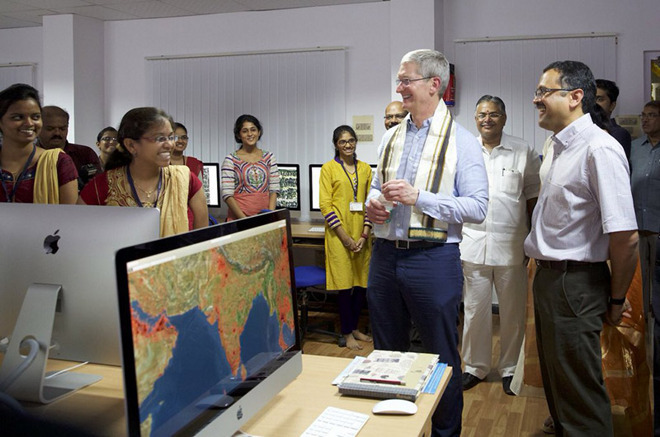India's government recently invited Apple, Google, Microsoft and Samsung to discuss embedding government-funded biometric technology into products sold within the country as part of an effort to register and authenticate its citizens. Apple did not attend.
A contingency of the Aadhaar program, a government-baked biometric identity initiative supported by developed in a government-funded lab, India's request that the world's top smartphone makers include the tech could become an ultimatum, reports Bloomberg.
Ajay Bhushan Pandey, who heads the Unique Identification Authority of India, called for the meeting "a few weeks ago." Along with Apple's refusal to attend, those companies that were present were reportedly non-committal despite Pandey's urgings.
"Go to your headquarters and work this out so that we can have Aadhaar-registered devices," Pandey reportedly said at the meeting.
An Aadhaar-compatible device offers two forms of authentication: India's Aadhaar biometrics and, if available, a first-party solution like Apple's Touch ID. Users would be able to unlock their device and authenticate purchases via Touch ID as normal. Once Aadhaar is accessed, presumably through a dedicated app, its own security and encryption protocols take over, effectively locking out manufacturer safeguards. The mechanism is worrisome for both companies concerned with user privacy and unfettered access to user data, alike.
The Aadhaar project kicked off in September 2010, when India began collecting biometric information from all Indian citizens and storing the digitized data in a centralized database. As part of the process, all registrants receive a 12-digit ID number, India's equivalent of a Social Security number. As of April, 83 percent of India's population, or some one billion people, are registered with Aadhaar.
With Aadhaar in place, India's government is better equipped to fend off criminals looking to take advantage of the country's welfare system, the report said. At the same time, the program is used to send welfare allowances, pension and work payments directly to the bank accounts of millions of underserved citizens. Electronic funds transfers appear to play a key role in Aadhaar's rollout, a feature designed to stimulate use of financial institutions in a country where such services are only now taking root.
In September of 2010, it began collecting citizens' biometric and demographic data, storing them in a centralized database and issuing a unique 12-digit ID number to every man, woman and child. Aadhaar is the world's largest such program; as of April this year more than one billion people had signed up, or about 83 percent of the population.
India is only asking manufacturers to consider Aadhaar integration at this time — Samsung already markets a compatible tablet in the region — but the country could choose to mandate implementation. For Apple, Aadhaar represents yet another roadblock to breaking into the Indian market. Aside from user privacy implications, Aadhaar might also pose problematic for Apple's rollout of Apple Pay, as India recently activated a digital payments infrastructure latticed to its home-brew biometric framework.
Apple has for years sought approval to open and operate branded brick-and-mortar stores in India, but regional foreign direct investment trade policies have effecively hampered those efforts. Previous reports indicate members of the Indian government, including the cabinet of Prime Minister Narendra Modi, are willing to work with Apple on a potential resolution, though an official Apple store has yet to open in the country.
 Mikey Campbell
Mikey Campbell







-m.jpg)






 Chip Loder
Chip Loder
 Mike Wuerthele
Mike Wuerthele
 Malcolm Owen
Malcolm Owen

 Amber Neely
Amber Neely
 William Gallagher
William Gallagher



-m.jpg)






44 Comments
One of the reasons why India is so far behind China etc
LOL! They're out of their bloody minds.
The user and all related content has been deleted.
Glad that Apple didn't attend. Also shows how low Samedung is. We are human beings, not cogs in some monstrous machinery.